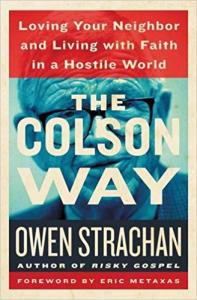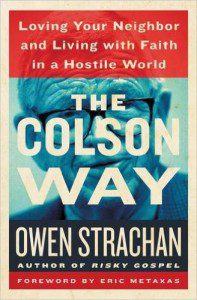I became Catholic because of Dorothy Day and Flannery O’Connor.
Thus begins “Becoming Catholic,” a personal essay written by Sarah Vanacore in a recent InterVarsity email newsletter. Vanacore, a grant writer and resident of an inner-city religious community, writes her story to share the reasons she left evangelicalism and embraced Catholicism. I want to briefly analyze her article and its placement in the IVCF newsletter. In doing so, I’m not throwing stones at Sarah Vanacore. I am writing out of concern for the direction of InterVarsity, a group I was involved with for four years as a student at Bowdoin College. IVCF seems increasingly cozy with Catholicism, and I am very concerned by this.
I want to make this post as concise as possible. I’m going to excerpt the most important parts of this piece. Here, then, are the reasons Vanacore became disenchanted with evangelicalism:
“By the time I entered college, I was disenchanted with the Christianity that I knew, with the rampant individualism that seemed to leave no room for the communal aspects of the Christian faith; with the reduction of things like Communion and baptism to symbols; with the splintering of the Protestant churches that I knew; and with the over-spiritualization of Jesus’ words.”
Here is what specifically attracted Vanacore to Catholicism:
“Then I started reading Flannery O’Connor. I was attracted to O’Connor’s vivid, stark imagery that contrasted completely with the schmaltz with which I’d stocked the shelves at my high school job at a Christian bookstore. And I loved Dorothy Day’s commitment to the poor, to social justice, and to hospitality. I was spending most of my Saturdays hanging out with the Philadelphian homeless, and I was convinced that to be Christian, one must not just care about the poor, but know them as well.
So the Southern gothic writer and the fiery co-founder of the Catholic Worker drew me in. At the same time, I found that some of my friends were on the same journey toward Catholicism, and they encouraged me to look more closely at what I believed. What I found most compelling was the Eucharist: that the bread and wine were not simply symbolic of Christ’s body and blood but actually became them. On top of that, I loved the liturgy; far from stifling my faith, I found the liturgy gave it its full expression while still allowing for cultural and musical differences.”
Here is Vanacore’s current position:
“I live now in an intentional community, which in itself is a study in denominational reconciliation: we have Catholics (both cradle and converts), Mennonites, and some post-evangelicals who haven’t quite felt at home anywhere. I do believe that Catholics and Protestants can work together, that we can reconcile and stand together on our core beliefs. I believe we must, in order to cause any sort of change in this world.”
Let us now examine these statements. Looking first at the reasons for Vanacore’s disenchantment, one can understand them. Evangelical Christianity can definitely be much too individualistic, the ordinances of Christ can easily become rudimentary and unimportant to us, and Christians can certainly unnecessarily divide over silly things. All of these weaknesses can and do happen. Now let’s consider Vanacore’s reasons for embracing Catholicism. She writes that evangelical literature left her cold and that she loved the commitment of certain Catholics to helping the poor. Many evangelicals I know would resonate with these sentiments. So far, Vanacore’s reasons don’t seem to be deep doctrinal quandaries, but rather personal frustrations that many evangelicals share. These are the not the matter of which a departure from evangelicalism–from true, biblical Christianity–should be made.
From there, Vanacore does register a few doctrinal discrepancies with evangelicalism: she likes the Catholic view of the Lord’s supper and she likes the liturgy. At the end of her article, she indicates that she wants to be a part of a movement of change. That, then, comprises her reasons for her departure from evangelicalism. Now that we’ve laid these things out, let’s analyze them a little closer.
As I’ve noted, I think it entirely understandable that an evangelical grow dissatisfied with church splits and cheesy Christian books. I also think it’s understandable to be frustrated with poor conceptions of key scriptural doctrines, like the Lord’s supper, or with shallow, me-centered, poorly executed congregational music. All of these frustrations, however, do not in any way merit an embrace of Rome and its teaching. Evangelicals all across the country have reacted to the frustrations Vanacore posits by digging into their local churches and by seeking to change them for the better. There’s a whole movement of young evangelicals, called the emerging church, which addresses many of the concerns Vanacore registers. One need not smile brightly at the prospect of reading schmaltzy Christian books to be a biblical Christian. Beyond this, though, I’m concerned by the worldview that seems to fuel Vanacore’s decisions. She seems to understand faith as a pick-and-choose proposition in which, if one does not like certain aspects of a given religion, one is eminently justified in simply switching teams, as it were. Though it does not appear in this garb–no, it comes in the garb of “seeking ancient, authentic faith” or something like that–it’s really just postmodernism with a good dash of American consumerism thrown in. If you don’t like the Christian faith, just leave it. Don’t do any deep doctrinal searching, don’t have extensive theological discussion about the matters of disagreement between Catholics and Protestants, no, simply switch your flag. This is very poor–and very dangerous–worldview thinking. It treats the Bible as a malleable book one may read with self-directed glasses. At no place does Vanacore quote Scripture or reveal any deep doctrinal thinking about her decision. She simply posits what she didn’t like about Christianity, notes what she liked about Catholicism, and seems to expect us to commend her–or at least, understand her–for her choice. I, for one, do not; I, for one, cannot. I tremble for her, because the Catholic Church does not teach the biblical truth on salvation, it teaches a false gospel.
One does not simply switch religions because one likes a certain musical style or bookseller list better. One does not simply observe which religion is most doing what one perceives religions should do and then take up that faith. One carefully studies the Bible, the Word of God, to see what God wants, to see what God teaches, and then carefully discerns which religion most fits that vision. Yet nowhere in this article do we have any sort of careful study noted. This really concerns me about IVCF. They have published this article. Why? It does not promote good worldview thinking, it does not show a concern for what God, not man, wants, and it tacitly–no, explicitly!–encourages evangelicals to rethink their commitment to evangelical Christianity based on their personal religious preferences. This is very troubling. This article suffers from a deficient understanding of Scripture, of evangelical Christianity, of current movements among evangelical Christians, and of man. We do not choose our religion based on what we like the most. We seek to discern what God wants and teaches, and we humbly, obediently, even fearfully conform to His will. I’d love to read Flannery O’Connor, and I hope to take Vanacore up on that proposition, and I’d love to develop a greater heart for the poor, but I fundamentally want to know what it is that God requires of me and then do that. That, and not any personal preference, is what must drive my thinking, my decisions, my very life.
Let us pray for IVCF and students like Sara who it seems to be influencing in a way of grave danger.















